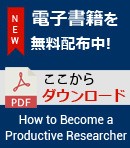セミナー内容
Data reproducibility is key to the reinforcement and credibility of scientific evidence. All results should be replicable by different investigators in varied geographical settings, using independent data, instruments, and analytical methods. In biomedical research, the reproducibility crisis is perpetual. To address this plaguing issue, researchers have adopted best practices such as the inclusion of standard research reporting guidelines, automation of data analyses, utilization of public data repositories, and revelation of negative or null results. Enago in collaboration with the Future Science Group—an independent publisher focused on breakthrough research in medical, biotechnological, and scientific research—conducted an advanced session to discuss the underlying causes of poor data reproducibility and ways to circumvent these pitfalls in their data.
Researchers will have a better understanding of the following:
- Primary reasons for poor data reproducibility
- Methods for addressing low reproducibility
- Standard research reporting guidelines
- Transparency and ethical reproducibility – Best practices and standards
About FSG (http://futuremedicine.enago.com; http://futurescience.enago.com)
Founded in 2001, Future Science Group (FSG) is a progressive publisher focused on breakthrough medical, biotechnological, and scientific research. FSG’s portfolio includes two imprints, Future Science and Future Medicine. Both publish eBooks and journals. In addition to this core publishing business, FSG develops specialist eCommunities. Key titles and sites include Bioanalysis Zone, Epigenomics, Nanomedicine, and the award-winning Regenerative Medicine. The aim of FSG is to service the advancement of clinical practice and drug research by enhancing the efficiency of communications among clinicians, researchers, and decision-makers, and by providing innovative solutions to their information needs.
主な対象者
- Graduate students
- Postdoctoral researchers
- Established researchers





 Dr. Chase is a published author and has worked for more than a decade in the dynamic fields of neuroscience, psychiatry, and molecular biology research. She completed her Ph.D. in Neuroscience from the University of Illinois at Chicago with a research focus in psychiatry. She is the recipient of the NARSAD Young Investigator Award, and NIH Loan Repayment Award. She currently teaches bioethics at The School of the Art Institute.
Dr. Chase is a published author and has worked for more than a decade in the dynamic fields of neuroscience, psychiatry, and molecular biology research. She completed her Ph.D. in Neuroscience from the University of Illinois at Chicago with a research focus in psychiatry. She is the recipient of the NARSAD Young Investigator Award, and NIH Loan Repayment Award. She currently teaches bioethics at The School of the Art Institute. Francesca Lake joined Future Science Group – a progressive publisher focused on breakthrough medical, biotechnological, and scientific research – following a Master’s degree in Biology from the University of Nottingham (UK). She currently holds two roles, as Head of Open Access and Editor-in-Chief of BioTechniques, the international journal of life science methods. As the latter, she is involved in helping BioTechniques authors report new methods that are ethical, robust, and reproducible.
Francesca Lake joined Future Science Group – a progressive publisher focused on breakthrough medical, biotechnological, and scientific research – following a Master’s degree in Biology from the University of Nottingham (UK). She currently holds two roles, as Head of Open Access and Editor-in-Chief of BioTechniques, the international journal of life science methods. As the latter, she is involved in helping BioTechniques authors report new methods that are ethical, robust, and reproducible.

